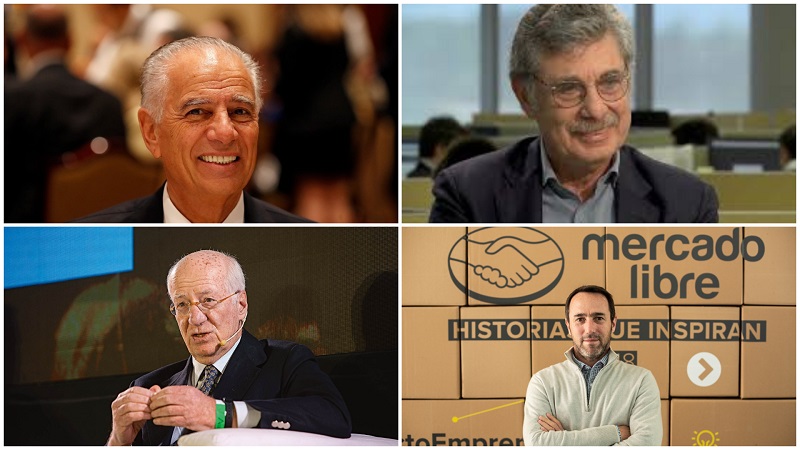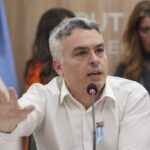
Millionaires becoming more and more millionaires. In Argentina, the 50 richest people in the country have fortunes equivalent to around USD 78,000 million. The amount is equivalent to 12% of the Gross Domestic Product (GDP)the totality of the wealth that a country’s working class creates throughout the year. This figure represents an increase of 68% compared to the 2020 ranking. It shows how, in a context of impoverishment of the vast majority of workers, a sector of the capitalist class continued to get richer.
Magnates del ranking de Forbes
Topping the list of the great Argentine billionaires is Marcos Galperinwith a heritage of 8.5 billion dollars. Owner and CEO of Mercado Libre, the businessman lives in Uruguay to avoid paying taxes in Argentina. An active defender of the Milei Government and its adjustment policies, he has benefited from all governments – beyond the political sign – with tax benefits from the State. Without going any further, in 2020, with votes from the Frente de Todos and Macrismo, an update of the Knowledge Economy Law was voted, which granted and grants it enormous exemptions.
Secondly, they are Hugo Sigman, Silvia Gold and children. They have an estimated fortune of 6.3 billion dollars. These are the owners and founders of Insud Pharma, a pharmaceutical conglomerate that during the pandemic benefited from enormous support from the national State.
Alejandro Pedro Bulgheronifrom Pan Pan American Energy (PAE), one of the most important oil companies in the country, is in third place. This businessman, like the entire oil and gas sector, has received enormous benefits from the State in various governments, with laws tailored to guarantee its profitability.
Fourth place is occupied Luis Pérez Companc. He has an estimated wealth of 4.2 billion dollars and is the head of the Molinos Río de la Plata group and the energy company Pecom. The Molinos group occupies a monopolistic position in the food sector, where it has enormous control in sectors such as the production of oils or noodles, essential elements in the diet of the popular sectors. This sector is where some of the most significant increases were recorded in the last year, at the expense of hunger among working people.
The fifth place on the list is Paolo Roccawhich heads the Techint group. In his case, a fortune of 4.1 billion dollars. The Techint group is an oligopoly that has weight in the steel and oil sector. Its headquarters are in the Duchy of Luxembourg, a small country known for the enormous tax advantages it grants to large capitalists, allowing them to evade taxes in their countries of origin.
Among those 50 billionaires is also: Javier Madanes Quintanillathe businessman who owns Fate (tires) and the Aluar steel company. His fortune is estimated at USD 1.5 billion. He is one of the big winners of the last period. Today, claiming to have a crisis that it does not have, it seeks to make the working conditions of the workers at the tire plant located in San Fernando more flexible.
They are also Alberto and Pablo Roemmershead of a transnational company, with enormous weight in the laboratory sector. His fortune is estimated at USD 2.4 billion. Along with Sigman, they are part of those who have been amassing millions with the skyrocketing increases in medicines that the Milei government allowed. This increase means that millions of retirees cannot directly buy them.
Eduardo Eurnekian, the businessman who catapulted Milei to politics, is another big winner. His current fortune is estimated at USD 3.5 billion. In 2020 had USD 1.1 billion. That is, he almost doubled his fortune in four years. He is the owner of Aeropuertos 2000, a company that operates in all airports in the country. In addition, it has investments in cable television and other areas. Like the rest of the list, he has always enjoyed benefits from the State.
While a small sector of society amasses increasingly larger fortunes, the vast majority of the population becomes poorer. He Milei’s wild adjustment deepens a trend that existed in governments and that has an international character. Capitalism is a system that generates inequality in itself. There is no control or “regulation” that can prevent this dynamic. At most, there are palliative measures that limit the collapse of the most humble sectors.
However, the reality of the international economy, even more so since the 2008 crisis onwards, is one of sustained growth in inequality. The so-called “Market”, in itself, only increases this trend, impoverishing millions and enriching a minority. “State regulation” cannot, either, reverse this trend.. The State responds to the interest of that economic elite, which continues to get richer.
Source: www.laizquierdadiario.com
